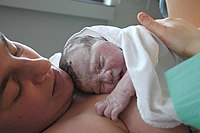
Assisted Reproductive Technology and Risk of Childhood Cancers
Sign Up to like & getrecommendations! Published in 2022 at "JAMA Network Open"
DOI: 10.1001/jamanetworkopen.2022.30157
Abstract: Key Points Question Are children conceived via assisted reproductive technology (ART) at a higher risk of childhood cancers? Findings In this nationwide population-based cohort study of 2 308 016 parents-child triads in Taiwan, children conceived via ART… read more here.
Keywords: reproductive technology; risk; assisted reproductive; childhood cancers ... See more keywords

Comparison of Genetic Profiles of Neonates in Intensive Care Units Conceived With or Without Assisted Reproductive Technology
Sign Up to like & getrecommendations! Published in 2023 at "JAMA Network Open"
DOI: 10.1001/jamanetworkopen.2023.6537
Abstract: Key Points Question Are molecular defects more common in newborns in the neonatal intensive care unit (NICU) conceived by assisted reproductive technology (ART) than in naturally conceived neonates? Findings In this cross-sectional analysis of infants… read more here.
Keywords: reproductive technology; intensive care; assisted reproductive; comparison genetic ... See more keywords

Associations of Assisted Reproductive Technology and Twin Pregnancy With Risk of Congenital Heart Defects
Sign Up to like & getrecommendations! Published in 2020 at "JAMA Pediatrics"
DOI: 10.1001/jamapediatrics.2019.6096
Abstract: This cohort study assesses the extent of association of assisted reproductive technology with congenital heart defects independent of its known association with twin pregnancies. read more here.
Keywords: assisted reproductive; congenital heart; reproductive technology; heart defects ... See more keywords

Assisted reproductive technology, risk of gestational diabetes and perinatal outcomes in singleton pregnancies.
Sign Up to like & getrecommendations! Published in 2023 at "Diabetes/metabolism research and reviews"
DOI: 10.1002/dmrr.3625
Abstract: AIMS To evaluate the impact of assisted reproductive technology (ART) on the risk of gestational diabetes (GDM) in single pregnancies. MATERIALS AND METHODS We retrospectively collected clinical and anthropometric data of219ART- and 256 age- and… read more here.
Keywords: assisted reproductive; art; risk gestational; reproductive technology ... See more keywords

Assisted reproductive technology in Japan: a summary report of 1992–2014 by the Ethics Committee, Japan Society of Obstetrics and Gynecology
Sign Up to like & getrecommendations! Published in 2017 at "Reproductive Medicine and Biology"
DOI: 10.1002/rmb2.12014
Abstract: The Japan Society of Obstetrics and Gynecology implemented a registry report system for the clinical practice of assisted reproductive technology in 1986. The aggregated results from 1992 to 2014 are reported herein. read more here.
Keywords: society obstetrics; obstetrics; assisted reproductive; obstetrics gynecology ... See more keywords

Clinical outcomes of assisted reproductive technology treatment by using a self‐injection of recombinant human chorionic gonadotropin as the final maturation trigger
Sign Up to like & getrecommendations! Published in 2018 at "Reproductive Medicine and Biology"
DOI: 10.1002/rmb2.12095
Abstract: To evaluate the efficacy and safety of self‐injections of the prefilled recombinant human chorionic gonadotropin (r‐hCG) in a syringe in assisted reproductive technology (ART) treatment for the maturation trigger (MT), as compared to self‐injections of… read more here.
Keywords: recombinant human; gonadotropin; human chorionic; assisted reproductive ... See more keywords

Genetic counseling prior to assisted reproductive technology
Sign Up to like & getrecommendations! Published in 2021 at "Reproductive Medicine and Biology"
DOI: 10.1002/rmb2.12361
Abstract: Reproductive medicine deals with fertility and is closely related to heredity. In reproductive medicine, it is necessary to provide genetic information for the patients prior to assisted reproductive technology (ART). Japan Society for Reproductive Medicine… read more here.
Keywords: medicine; reproductive medicine; assisted reproductive; prior assisted ... See more keywords

Assisted reproductive technology in Japan: A summary report for 2020 by the ethics Committee of the Japan Society of obstetrics and gynecology
Sign Up to like & getrecommendations! Published in 2023 at "Reproductive Medicine and Biology"
DOI: 10.1002/rmb2.12494
Abstract: Abstract Purpose Since 1986, the Japan Society of Obstetrics and Gynecology assisted reproductive technology (ART) registry system has collected data on national ART use and outcomes trends in Japan. Herein, we describe the characteristics and… read more here.
Keywords: obstetrics gynecology; japan society; obstetrics; assisted reproductive ... See more keywords

Increased risk of metabolic dysfunction in children conceived by assisted reproductive technology
Sign Up to like & getrecommendations! Published in 2020 at "Diabetologia"
DOI: 10.1007/s00125-020-05241-1
Abstract: Aims/hypothesis Assisted reproductive technology (ART) is the most widely used treatment for infertility and has resulted in millions of births worldwide. The safety of the offspring has been of the utmost concern. Previous studies suggested… read more here.
Keywords: children conceived; assisted reproductive; metabolic; reproductive technology ... See more keywords

Endometrioma and assisted reproductive technology: a review
Sign Up to like & getrecommendations! Published in 2022 at "Journal of Assisted Reproduction and Genetics"
DOI: 10.1007/s10815-022-02403-5
Abstract: Endometriomas are a common cause of infertility necessitating assisted reproductive technology (ART). It had been previously thought that surgical removal of the endometriomas prior to ART would improve reproductive outcomes, but recent data suggests that… read more here.
Keywords: reproductive technology; technology review; endometrioma assisted; assisted reproductive ... See more keywords

Neurodevelopmental Outcomes of Preterm Infants Conceived by Assisted Reproductive Technology.
Sign Up to like & getrecommendations! Published in 2021 at "American journal of obstetrics and gynecology"
DOI: 10.1016/j.ajog.2021.03.027
Abstract: BACKGROUND There have been concerns about potential adverse consequences of assisted reproductive technology on the development of children conceived in this way. Despite multiple studies investigating the outcomes of assisted conception, data focusing specifically on… read more here.
Keywords: age; neurodevelopmental outcomes; conceived assisted; assisted reproductive ... See more keywords